Contents
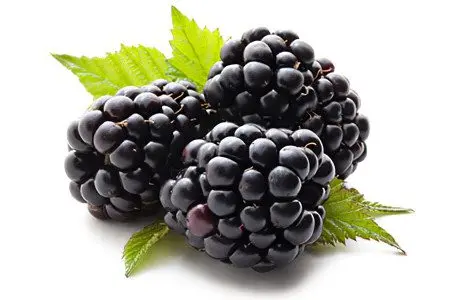
The blackberry is a berry subshrub that is common in forested areas. Due to the amazing taste of the fruit, the beneficial properties of almost all parts of the plant, blackberries are increasingly bred in gardens. On an industrial scale, blackberries are cultivated in the countries of North America and Eastern Europe, New Zealand, Chile. In Russia, it is distributed in the wild. In recent years, garden varieties that do not have thorns have been available to amateurs.
What does a blackberry look like and what does it taste like?
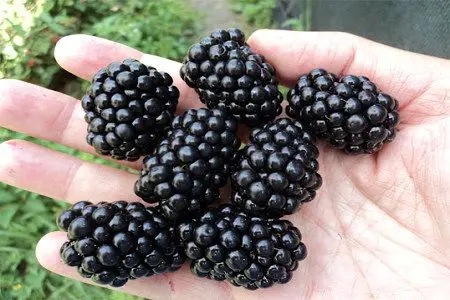
Despite the botanical definition of “shrub”, people usually refer to the blackberry as “shrub”. In the wild, it forms rather dense thickets, formed from several bushes. Sometimes the area of blackberries reaches quite impressive sizes. At the same time, the branches of the plant are intertwined with each other and it becomes impossible to pass between the bushes.
Blackberry in favorable conditions reaches up to two meters. Some garden varieties grow up to 3-5 meters in height and form real arches, on which berries appear over time. Branches of creeping blackberries can reach up to 10 meters in length. The surface of the woody shoots of wild shrubs is covered with long sharp thorns, so in the forest you can often see how blackberry branches cling to tree trunks and braid them.
Blackberry leaves are bright green. In young plants, they may have a brownish or pale red tint. One petiole can develop three, five or seven leaflets.
In the first weeks of summer, blackberry bushes are covered with large white flowers, the diameter of which can reach up to 1,5-2 cm. At the ends of the branches, several flowers form tassels that attract bees.
The first fruits appear in July. They are multi-seeded drupes, which over time become filled with juice and change color from light, yellowish to very dark, inky.
The size of blackberries depends on the variety. The berries of wild-growing blackberries are smaller than those of the garden. Ripe blackberries are very juicy. The fruits are round or oblong. The taste is sweet, sometimes with sour notes.
Chemical composition
Blackberries are a berry rich in vitamins and minerals. In the pulp of berries, a high concentration of manganese is recorded – which can reach up to 40% of the daily norm. Manganese is responsible for blood glucose levels, bone density and the prevention of seizures. It is important to note that a specific enzyme was found in blackberries, thanks to which manganese is involved in the formation of collagen and wound regeneration processes. In addition, blackberries are a good source of copper and iron, as well as magnesium and potassium.
Calories 43 KKal
- Fats:
0,49 g
- Proteins:
1,39 g
- Carbohydrates:
9,61 g
- Water:
88,15 g
- Ash:
0,7 g
- Cellulose:
5,3 g
Vitamins | Quantity | % RDN |
Vitamin C (ascorbic acid) | 21 mg | 23% |
Vitamin K | 19,8 mcg | 17% |
Vitamin E (alpha tocopherol) | 1,17 mg | 8% |
Vitamin B5 (pantothenic acid) | 0,28 mg | 6% |
Vitamin B9 (folic acid) | 25,0 mcg | 6% |
Vitamin B3 (PP, nicotinic acid) | 0,65 mg | 4% |
Beta-carotene | 128,0 mcg | 3% |
Vitamin B4 (choline) | 8,5 mg | 2% |
Lutein + Zeaxanthin | 118 mcg | 2% |
Vitamin A (retinol) | 11,0 mcg | 1% |
Minerals (in 100 g): | Quantity | %RDN |
Manganese, Mn | 0,65 mg | 28% |
Copper, Cu | 0,17 mg | 18% |
Iron, Fe | 0,62 mg | 6% |
Zinc, Zn | 0,53 mg | 5% |
Magnesium, Mg | 20 mg | 5% |
Potassium, K | 162 mg | 4% |
Phosphorus, R | 22 mg | 3% |
Calcium, Ca | 29 mg | 3% |
Blackberries contain acids – malic, citric, tartaric and salicylic. Even small seeds contain useful substances – 9-12% fatty oils.
9 Scientifically Proven Health Benefits of Blackberries
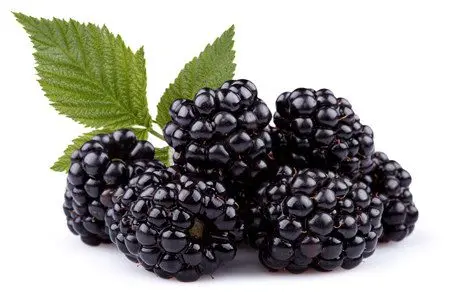
Particular attention in the study of blackberry valuable substances is given to antacids and plant flavonoids, which have a preventive and curative effect on a number of diseases. Scientific studies have shown that the pigment anthocyanin, due to which blackberries stand out among all berries with a special purple or blue color, has a powerful antioxidant effect, positively affects metabolism, slows down age-related changes and related diseases.
Blackberry fruits have an antipyretic effect. Blackberries are a natural replacement for aspirin, which does not harm the body and has a positive effect on every organ.
Blackberry has a tonic, diaphoretic and anti-inflammatory properties.
1 Reduces cholesterol
Anthocyanins, which are rich in blackberries, prevent oxidative reactions involving low-density lipoproteins (“bad” cholesterol). Laboratory studies have shown that blackberry extract reduces the likelihood of developing cardiovascular diseases and atherosclerosis, which is accompanied by the deposition of plaques in the lumen of blood vessels, by 50%. [1].
2 Protects against certain cancers
Studies have shown that, due to anthocyanins, blackberries can inhibit the growth of breast and stomach cancer cells. It has been proven that the active ingredients more than halve the likelihood of lung and colon cancer. Unfortunately, blackberries cannot cure cancer, but the introduction of berries into the diet can be part of complex therapy.
Active blackberry polyphenols protect cells from mutations and malignant transformations. Experiments have shown that blackberry extract is able to suppress tumor growth, suppress the effect of negative factors [1].
The results of experiments with animals confirm that anthocyanins inhibit the growth of various types of cancer cells:
Carcinomas of the oral cavity.
mammary gland.
Large intestine.
prostate gland.
It is noteworthy that an increase in the dose of blackberry extract enhances the inhibitory cell proliferation.
3 Prevents gum infection
Blackberry extract contains substances with antibacterial and anti-inflammatory properties. The joint mechanism of these compounds protects periodontal tissues and helps to treat oral diseases. [2].
4 Maintains bone density
100 grams of blackberries contain more than 30% of the daily recommended dose of vitamin K. Vitamin K is involved in the synthesis of platelets, supports the normal mechanism of blood clotting, protein absorption, and bone health. Vitamin K and manganese, which is also found in large quantities in blackberries, provide bone development, prevent the development of osteoporosis and osteopenia.
5 Support brain health
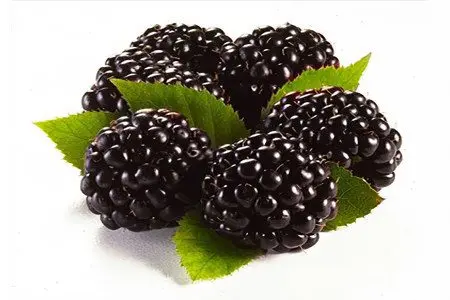
Studies have repeatedly proven that anthocyanins have a beneficial effect on the condition of patients suffering from Alzheimer’s disease. Preliminary data on the properties of anthocyanins suggest that their activity suppresses the toxicity of beta-amyloids, which form deposits in the brain. Beta-amyloids disrupt the integrity of the nerve pathways, which leads to the destruction of brain cells and the appearance of a degenerative process. It is important to know that beta-amyloid deposits are divided into soluble, causing Alzheimer’s disease, and insoluble, which do not cause brain damage and do not have a toxic effect.
In 2016, the result of a study conducted on mice was published in Nutritional Neuroscience. Animals received daily blackberry extract in the amount of 1% of the total food. Anthocyanins caused a change in the structure of toxic beta-amyloids in the brain [3].
Objective results of studying the active properties of blackberries showed that the systematic use of berries improves motor coordination, balance, and memory processes. In parallel, the subjects who took blackberry extract showed an increase in working capacity.
6 Prevents blood clots
The antithrombotic effect of blackberries has been proven by laboratory experiments. Active ingredients protect the vascular wall, stimulate blood flow and have an anticoagulant effect. [4].
7 Maintains dental and oral health
In 2013, data from a long-term study of the active effects of blackberries in relation to diseases of the oral cavity appeared. [5]. It turned out that the berry extract inhibits the growth and activity of bacteria and viruses that cause diseases of the teeth and mucous membranes of the mouth. There is evidence that the use of blackberries prevents the development of caries, improves the condition of the gums and periodontal tissues.
8 Alleviates the symptoms of diabetes
Blackberry phenolic compounds have anti-inflammatory and anti-diabetic properties. The use of blackberry-based formulations controls blood glucose levels, improves the functioning of pancreatic cells. Active substances protect blood vessels from the damaging effects of glucose and pro-inflammatory cytokines that accompany the diabetic process.
9 Improves hair condition
During the study of different parts of the blackberry bush (berries, flowers, leaves), the effect of stimulating hair follicles was revealed. The maximum result was shown by the use of blackberry leaf extract. According to an animal study, when using a concentrated blackberry extract, the activation of hair follicles is observed on the 5-7th day of application.
Other studies on the benefits of blackberries
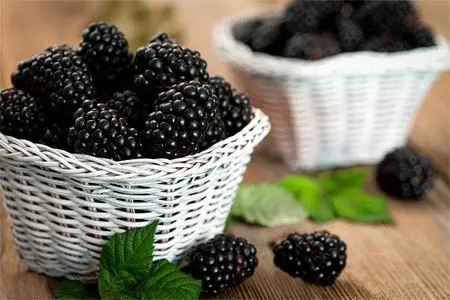
Interest in blackberries is increasing every year. If cooks and confectioners are attracted by the taste of berries, then scientists are busy studying the potential of blackberries for medicinal purposes. Botanists are making efforts to create progressive methods for protecting natural and artificial plantations of blackberries, increasing and preserving the crop. In a short time, scientists conducted a number of studies, the results of which were published in authoritative publications:
Antioxidant resource and phenolic profile of blackberry anthocyanin extract followed by human intestinal microbiota fermentation. A number of experiments have confirmed that blackberry anthocyanins interact with the intestinal microflora. The result of the interaction processes are metabolites that have the ability to suppress oxidative stress, providing an antioxidant effect. [6].
The effect of blackberry juice on anxiety behavior in rats. During the study, several groups of animals in a state of acute stress received blackberry extracts of various concentrations. Control data confirmed that blackberry juice has therapeutic properties for increased anxiety that arose against the background of an acute psycho-emotional shock. [7].
Blackberry extract inhibits telomerase activity in human rectal cancer cells.” In laboratory experiments, the effect of concentrated blackberry extract on human colorectal cancer cells was studied. The findings of scientists suggest that the active substances of the blackberry extract inhibit the development of altered cells. [8].
A mixture of blackberry leaf and fruit extracts alleviates non-alcoholic fatty liver disease (steatosis), improves intestinal integrity, and increases the beneficial bacteria Lactobacillus and Akkermansia in rats.” Steatosis was artificially induced in experimental animals. Then they were fed for 12 weeks with a 50% alcohol extract of blackberry leaves and fruits at a dosage of 450 mg per 1 kg of body weight. Control tests have shown that blackberry extract reduces the concentration of triglycerides and hepatic lipid peroxides, alleviates the symptoms of intestinal dysbiosis, and increases the level of beneficial intestinal bacteria. In parallel, it was found that the regular use of blackberry extract stimulates the work of genes responsible for beta-oxidation, reduces the number of genes that stimulate the biosynthesis of fatty acids. [9].
Useful properties of blackberry leaves
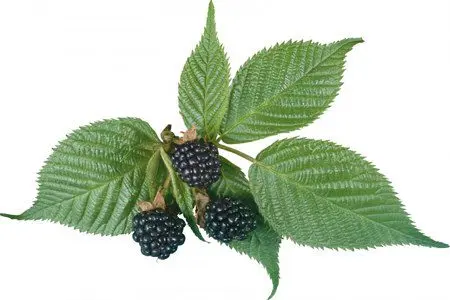
Blackberry leaves have no less healing properties than berries. Of the many therapeutic effects established against the background of the use of blackberry leaf-based products, it is worthwhile to dwell on the following:
Anti-cold – due to the high concentration of ascorbic acid, hot drinks from blackberry leaves lower the temperature, stop coughing attacks, and suppress viral activity.
Anti-aging – achieved with tocopherol. The active ingredient slows down age-related changes, nourishes and heals the skin, smoothes fine wrinkles.
Antibacterial, wound healing – it has been proven that the external use of blackberry leaves prevents infection of wounds, accelerates their healing, skin regeneration.
Hypnotic – warm blackberry decoction helps to calm the nerves after a busy day, stabilizes the central nervous system, helps fight insomnia.
Vascular strengthening – a high level of iron has a positive effect on the density and elasticity of the vascular wall. Regular use of a decoction of blackberry leaves helps to strengthen the myocardium, stabilize blood pressure in hypertension, and reduce total cholesterol.
Means prepared on the basis of blackberry leaves are used for the prevention of cancer, especially with a aggravated family history.
Women with the help of decoctions and tinctures from the blackberry leaf can improve the condition of the skin, hair, nails. High concentrations of vitamin E and zinc help to normalize the menstrual cycle, relieve painful periods.
Men should also pay attention to blackberry leaves. The active elements that make up their composition stimulate the synthesis of testosterone, improve the composition of sperm, and help in the treatment of male infertility.
Application in folk medicine
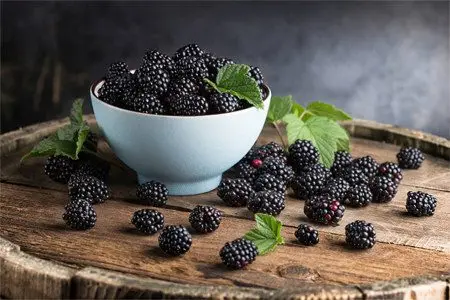
Traditional medicine uses almost all parts of blackberries – roots, leaves, berries. The plant received special recognition from folk healers due to its pronounced tonic, anti-inflammatory and antibacterial properties. The ability of blackberries to purify the blood and heal wounds is known. Since ancient times, blackberries have been recommended for people with nervous disorders, hysterical states, and neuroses.
Blackberry juice and decoction are used as an anti-inflammatory agent for liver diseases, ascites and hemorrhoidal bleeding. A decoction and infusion from the aerial part of the plant is recommended for gastritis, helminthiasis and anemia. Preparations from the aerial part of the blackberry can also be used externally – for ulcers, stomatitis, tonsillitis and purulent wounds. Ripe blackberries are used as a laxative.
An infusion prepared from blackberry leaves is used for sore throats and bleeding gums. Blackberry is a general tonic that normalizes sleep and reduces general excitability.
Blackberries are part of some fees that are used for hysteria, atherosclerosis and hypertension. Blackberry juice is used as a thirst quencher for fevers.
The internal use of blackberries is indicated for the treatment of diseases of the digestive system. With its help, it is possible to stop pain in the stomach, stop gastric bleeding, eliminate foci of inflammation in the small intestine, and improve peristalsis.
A folk recipe, effective for enteritis, gastric bleeding, gastritis, involves the use of blackberry leaves. For cooking, take a tablespoon of crushed leaves, brew with a glass of boiling water and incubate for about 3 hours. The drug is taken 100-150 ml 20-30 minutes before meals, three times a day.
Blackberry root was also used to stop internal bleeding. It was washed in several waters, crushed and filled with water at a ratio of 1:5. The whole mass was boiled over low heat to half the original volume, filtered. Red wine was added to the resulting composition in a ratio of 1:1. The agent was taken 50 ml up to 3-4 times a day, before meals.
For the treatment of chronic enteritis, you can use the recipe of Ukrainian herbalists. They prepared a decoction of blackberry leaves (200 g) and calendula flowers (100 g), which were steamed with 0,5 liters of boiling water and kept for about two hours. The finished product was drunk 1 teaspoon three times a day.
Bulgarian healers used a decoction of blackberry leaves. Approximately 20 g of chopped greens were poured into 1 liter of hot water. After cooling to an acceptable temperature, the remedy was drunk for diarrhea, gastritis, stomach ulcers.
From traditional medicine recipes, it became known that blackberries are effective for digestive problems. It is noteworthy that unripe fruits have a fixing effect on diarrhea, and overripe ones help get rid of constipation.
Blackberries have long been given to patients with sore throats, gum problems. For colds, coughs, a decoction of leaves and blackberry juice (4: 1) was prepared for gargling. A decoction of the leaves was given at elevated temperature, kidney disease. The combination of St. John’s wort and blackberry leaves has been used for inflammation of the oral mucosa. For the treatment of menstrual irregularities, chronic pain, women used blackberry decoction inside, and as douching – for whites.
Blackberry leaves are a versatile raw material that can be used internally and externally. Decoction-based compresses are used to treat purulent wounds, difficult-to-heal trophic ulcers, and bacterial skin lesions.
For the preparation of recipes for folk healers, raw materials are harvested in the summer – young leaves and ripe berries are harvested. The leaves are dried so that their color does not change. For this purpose, they are laid out in dark, well-ventilated places. If an oven is used for drying, the oven temperature should not exceed 50°C. Prepared raw materials are stored in glass, tightly closed jars.
[Video] The use of blackberries in traditional medicine:









